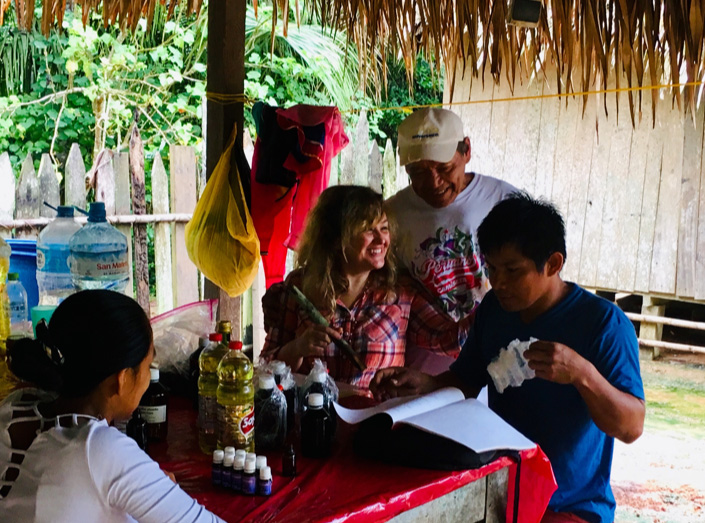
Kelly training a budding Shipibo aromatherapist. Central, Peru © Kelly Ablard 2019
Aniba rosaeodora (rosewood) faces possible extinction due to unsustainable harvesting and management practices driven by a high global demand for its precious essential oil. Native to many biodiversity hotspots throughout South America, the loss of rosewood is inseparable from the loss of many other native species. Its cultural importance among the Shipibo Indigenous people of Peru attests to its perennial value as a traditional aromatic and spiritual medicine with a reputation for strengthening the heart and relationships. Airmid’s Toucan Project (named after the tropical bird which, apart from its bright colors, is known for dispersing rosewood seeds) facilitates sustainable cultivation, environmental conservation, and community education, enrichment and engagement.
The overall outputs of projects such as Toucan embrace the following:
- Meeting the needs of Indigenous communities seeking to learn more about protecting plants used in their traditional medicine, as well as to create ways to generate income that will provide greater economic independence.
- Providing education to communities in ways that renew and reinforce their connection to the land and their plant medicine.
- Helping to build and enrich connections between Indigenous peoples and collaborators of diverse backgrounds and ethnicities, together with policymakers who can support the traditional use of Indigenous plant medicine through scientific research, government-funded programs, and the documentation of oral records.
- Introducing new tools and skill sets to Indigenous communities seeking to learn techniques that can help them secure income and protect their land and plants for future generations. Techniques include distillation, species surveying using GPS, aromatherapy training, soft skill training, organizational and leadership skills, designing, managing, and monitoring and reporting on projects.
- Generating income from sustainably produced, pure plant oils which is fairly distributed among communities to help, for example, supplement school supplies and books, provide children with shoes, repair infrastructure, and subsidize costs for those community members wishing to advance their education beyond their immediate environs.
We hope you will join us as an Airmid member to help preserve essential and carrier oil-bearing plants and the Indigenous cultures that rely on them. Together we can work to protect the plants as part of our healing journey.


